We are asked often about the differences in treatment and cost for getting teeth cleaned. Since it has become such a common question, I thought we'd answer it simply in a blog post.
Dental Cleanings
According to the American Dental Association, this is the definition of an adult dental cleaning (technically a prophylaxis): "A dental prophylaxis performed on transitional or permanent dentition, which includes scaling and polishing procedures to remove coronal plaque, calculus, and stains. Some patients may require more than one appointment or one extended appointment to complete a prophylaxis. Document need for additional time or appointments."
Dr. Fletcher's No-Nonsense Explanation: I realize that is a lot of words, so let me break it down. A dental cleaning is done for people with healthy gums. It removes plaque and calculus (also known as tartar) from above the gum line. This is typically completed by a hygienist in one visit. The hygienist may use a scaler/curette (patients refer to them as metal picks) or an ultrasonic scaler (commonly referred to as the tool that "vibrates, buzzes and shoots water"). Lastly, the hygienist will polish your teeth with an air-driven slow-speed prophy cup filled with flavored pumice.
The key: the patient has healthy gums (meaning no bone loss, no periodontal disease) and the teeth are simply cleaned in one visit.
Root Planing
According to the American Dental Association, root planing (deep cleaning) is defined as follows: "This procedure involves instrumentation of the crown and root surfaces of the teeth to remove plaque and calculus from these surfaces. It is indicated for patients with periodontal disease and is therapeutic, not prophylactic, in nature. Root planing is the definitive procedure designed for the removal of cementum and dentin that is rough and/or permeated by calculus or contaminated with toxins or microorganisms. Some soft tissue removal occurs. This procedure may be used as a definitive treatment in some stages of periodontal disease and/or as a part of pre-surgical procedures in others."
Dr. Fletcher's No-Nonsense Explanation: Let me simplify it for this blog post. This is not a cleaning. The patient getting root planing does not have healthy gums. It is therapy or treatment for diseased gums. Your teeth are probed/measured for the purpose of diagnosis. Patients with good oral hygiene can manage pocket depths at 3-4mm. Probing depths 5mm and above with evidence of plaque, calculus, inflammation or infection require treatment of the tooth and root surfaces. This is done typically one corner of the mouth at a time with dental anesthetic. It is always followed up with a reevaluation, to make sure the treatment was successful.
The key: the patient has been diagnosed with periodontal disease (bone loss has occured and acute or chronic gingival inflammation is present). This treatment is completed 1/4 of the mouth at a time with dental anesthetic. The patient may leave with an antibiotic or an antimicrobial rinse.
Periodontal Maintenance
This is the most confusing part of periodontal therapy. Periodontal Maintenance is defined by the ADA as follows: "This procedure is for patients who have previously been treated for periodontal disease. Typically, maintenance starts after completion of active (surgical or nonsurgical) periodontal therapy and continues at varying intervals, determined by the clinical diagnosis of the dentist, for the life of the dentition. It includes removal of supra and subgingival microbial flora and calculus, site specific scaling and root planing where indicated, and/or polishing teeth. When new or recurring periodontal disease appears, additional diagnostic and treatment procedures must be considered."
Dr. Fletcher's No-Nonsense Explanation: This seems like a cleaning, except it's for patients who have previously had gum surgery or root planing...aka they do not have a healthy mouth. The hygienist will go after troubled spots, numb if necessary, and constantly evaluate the "state of disease." The name explains a lot: Periodontal Maintenance, in other words the dentist/staff are maintaining the current conditions and trying to prevent them from getting worse. They may be more frequent than dental cleanings too.
The key: Not a cleaning, but it sure feels like one, because the whole mouth is treated in one visit. It is more active, more thorough and more involved.
The comments are open on this post, so feel free to ask questions that you may have.
Keep smiling!
ARFDDS




